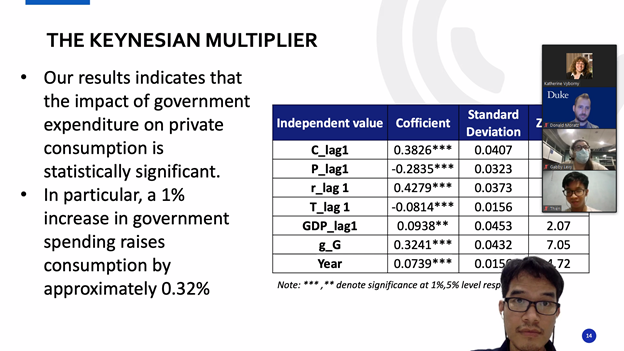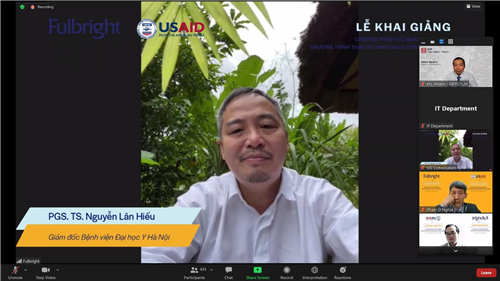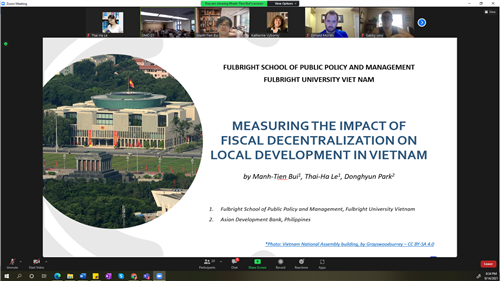Duke University is organizing a series of joint workshop this fall semester with three leading universities/research centers in Vietnam, including Fulbright School of Public Policy and Management (FSPPM) at Fulbright University Vietnam. The goal is to share feedback on work in progress, as well as to expand their research networks for potential future collaborations.
The workshops are held weekly from August 31 to November 2, 2021. FSPPM representatives – Bui Manh Tien and Chu Duc Manh – presented two papers at two separate events; other Vietnamese researchers come from Mekong Development Research Institute (MDRI) and Development and Policies Research Center (DEPOCEN).

Bui Manh Tien, a former student of FSPPM's Master in Public Policy (MPP) Class of 2021 and currently Research Assistant at FSPPM, presented his paper entitled "Impacts of fiscal decentralization on local development in Vietnam". On a sample of 63 provinces during 2011- 2019, the study examines the impact of fiscal decentralization on provincial socio-economic development and the efficiency of provincial governments. Overall, the empirical findings support a positive impact of fiscal decentralization on local multidimensional development, measured by gross regional domestic product, local revenues, continuous educational attendance at upper-secondary level, and infant mortality, as well as the efficiency of local governments in using their resources for such purposes. To escalate such positive impact, the research suggests strengthening of decentralization, especially fiscal decentralization in Vietnam via boosting local tax authority. The fiscal assignment should be provincial-specifically adjusted in consideration of efficiency and equity in resources allocation for development. Furthermore, this research recognizes a combination of favorable institutional environment and capable local government in inspiring the impact of fiscal decentralization and local governments' efficiency. A professional local administration with strong accountability, and a solid knowledge of the local conditions and preferences is optimal for fiscal decentralization. Without these factors, the effect of decentralization is weakened.

Chu Duc Manh, a former student of FSPPM's MPP Class of 2019 and currently a teaching assistant at FSPPM, presented his paper entitled "Gauging changes in marginal propensity to consume caused by government expenditure: Evidence from a global sample". This study aims to gauge the size of Keynesian multiplier for a global sample. It defines the Keynesian multiplier as the percent change of private consumption contributed by 1% change in government expenditure in this year. To achieve the research problem, the author applies a comprehensive theoretical model developed by Hagedorn, Manovskii, and Mitman (2019) for a large dataset covering 23 countries at the yearly frequency over the period 1990-2019. To address the problem of endogeneity among macro variables and the possible country-specific unobserved factors, the Panel Vector Auto Regression (PVAR) method is employed. The study indicates that the Keynesian multiplier is around 0.32 for overall sample. In other words, an 1% increase in government spending raises private consumption by 0.32%. This finding proves the effectiveness of fiscal policy in recent year. As a result, it implies the macroeconomic implications during Covid-19 pandemic. Besides, the study finds a negative and significant relationship between central government debt to GDP ratio and the effectiveness of fiscal stimulus.
- Thuy Hang
Related Articles

MPP Student's Welcome Speech for the Convocation 2021-2022

President's Opening Remarks on Fulbright University Vietnam's Convocation 2021-2022


